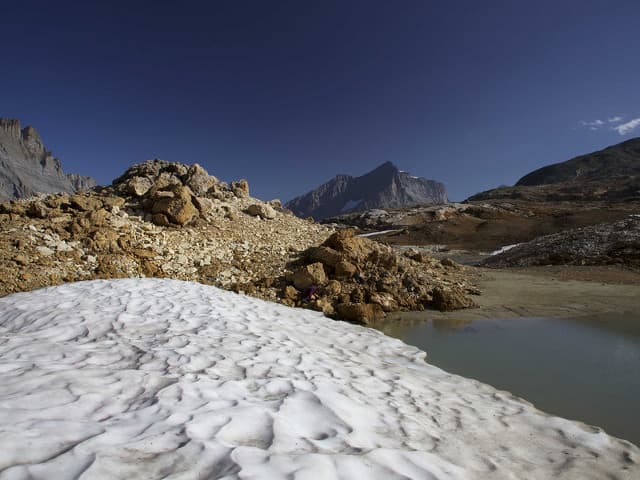4,000-year-old lunch box found on Swiss alpine pass reveals Bronze Age cereal

A Bronze Age wooden box uncovered in the Swiss mountains in 2012 has proved an exciting find for scientists as it sheds new light on the kind of food eaten by prehistoric settlers.
The well-preserved 20cms diameter wooden container was found at 2,690m on the Lötschenpass in 2012.
Carbon dating showed it was about 4,000 years old, the Max Planck Institute for the Science of Human History in Germany said in a press release on the publication of its research on Wednesday.
Inside the box, archaeologists discovered microscopic remains of early wheat varieties, providing new evidence that such cereals were used as food at the time.
Scientists made the discovery when analyzing the vessel for milk residue, suspecting that it may have contained some kind of porridge. However no trace of milk was found.
Instead they discovered alkylresorcinols, biomarkers found in wholegrains today such as wheat and rye bran.
Though early Bronze Age wheat has previously been found in caves, such biomarkers have never before been reported in archaeological finds.
“There are very few biomarkers for plants, and they are usually poorly preserved on historical finds. This is why the study is so exciting for us,” said the study’s author André Colonese.
The find will allow researchers to discover more about how Bronze Age people used grain.
“The molecular marker for grain also helps us explore the beginnings of agriculture,” said the institute’s Jessica Hendy. “It will enable us to gather information on when and how wheat spread throughout Europe.”
Though researchers cannot know for certain why the box was on the high alpine pass, they speculate that it could have belonged to a farmer driving his cattle up to high alpine pastures, or someone travelling on what may have been an early trade route between the Bernese Oberland and the Valais.
“This evidence sheds new light on life in the prehistoric alpine communities,” said researcher Francesco Career.
“People travelling across the alpine passes carried food for their journey, just like today’s hikers do. This research helps us to understand which food they considered most suitable.”
The research project was a collaboration between the Max Planck Institute, researchers in Swiss cities Bern and Basel and the universities of York, Copenhagen, Newcastle and Oxford.
Comments
See Also
The well-preserved 20cms diameter wooden container was found at 2,690m on the Lötschenpass in 2012.
Carbon dating showed it was about 4,000 years old, the Max Planck Institute for the Science of Human History in Germany said in a press release on the publication of its research on Wednesday.
Inside the box, archaeologists discovered microscopic remains of early wheat varieties, providing new evidence that such cereals were used as food at the time.
Scientists made the discovery when analyzing the vessel for milk residue, suspecting that it may have contained some kind of porridge. However no trace of milk was found.
Instead they discovered alkylresorcinols, biomarkers found in wholegrains today such as wheat and rye bran.
Though early Bronze Age wheat has previously been found in caves, such biomarkers have never before been reported in archaeological finds.
“There are very few biomarkers for plants, and they are usually poorly preserved on historical finds. This is why the study is so exciting for us,” said the study’s author André Colonese.
The find will allow researchers to discover more about how Bronze Age people used grain.
“The molecular marker for grain also helps us explore the beginnings of agriculture,” said the institute’s Jessica Hendy. “It will enable us to gather information on when and how wheat spread throughout Europe.”
Though researchers cannot know for certain why the box was on the high alpine pass, they speculate that it could have belonged to a farmer driving his cattle up to high alpine pastures, or someone travelling on what may have been an early trade route between the Bernese Oberland and the Valais.
“This evidence sheds new light on life in the prehistoric alpine communities,” said researcher Francesco Career.
“People travelling across the alpine passes carried food for their journey, just like today’s hikers do. This research helps us to understand which food they considered most suitable.”
The research project was a collaboration between the Max Planck Institute, researchers in Swiss cities Bern and Basel and the universities of York, Copenhagen, Newcastle and Oxford.
Join the conversation in our comments section below. Share your own views and experience and if you have a question or suggestion for our journalists then email us at [email protected].
Please keep comments civil, constructive and on topic – and make sure to read our terms of use before getting involved.
Please log in here to leave a comment.